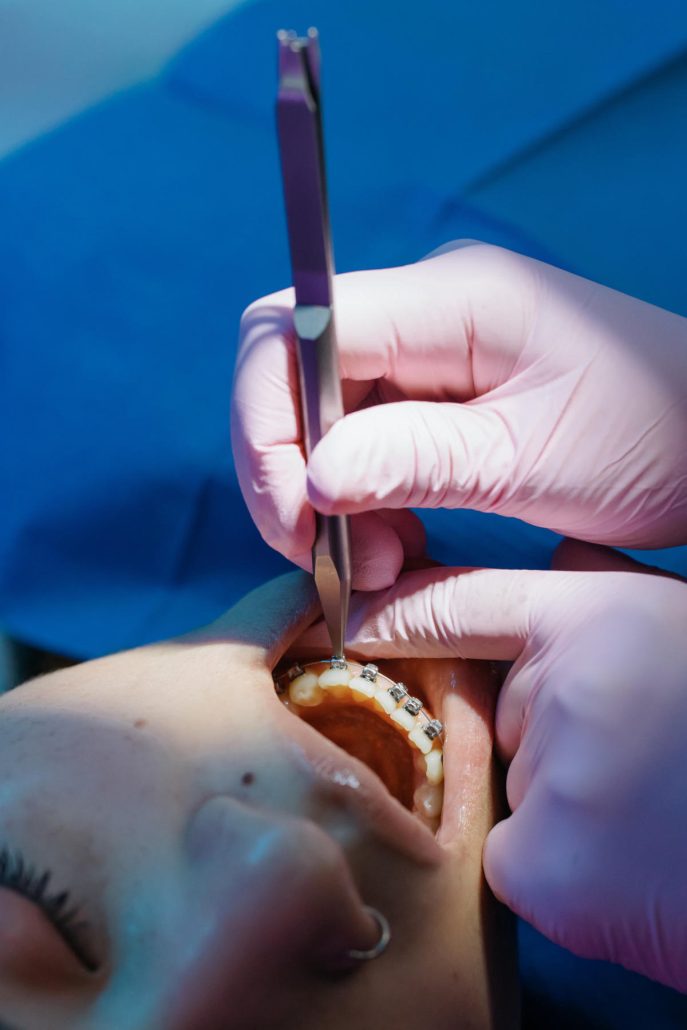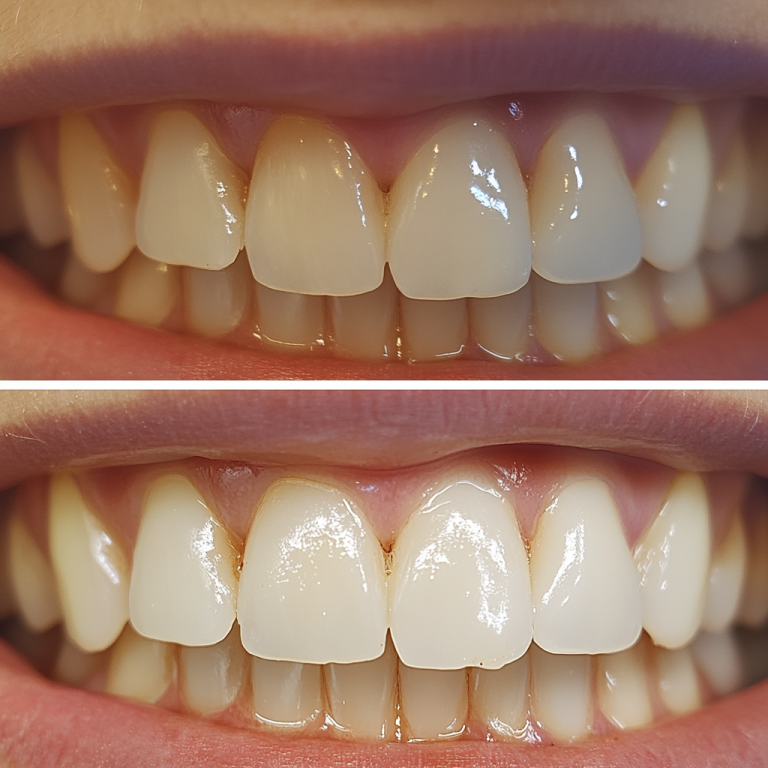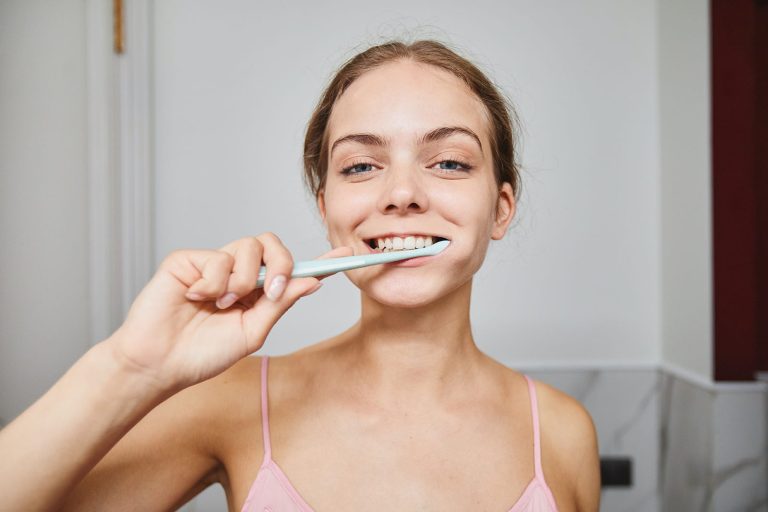Do braces ever stop cutting your mouth? Let’s find out!
When you first get braces, they may rub against soft tissues, causing cuts and sores. This discomfort is temporary. Adjustments can cause soreness and irritation, but they’re necessary. With each adjustment, there is a chance the braces may still cut your mouth.
Fear not! Orthodontic wax provides a protective barrier between the brackets and your cheeks, preventing more cuts or sores. Warm saltwater rinses can help soothe existing cuts.
Take Sarah for instance. She had just tightened her braces, when she noticed they were cutting her inner cheek. Eating became difficult. She applied wax to the areas of irritation and this simple solution provided relief!

Why do braces sometimes cut the mouth?
Braces are known for their ability to straighten our teeth and give us that perfect smile we’ve always wanted. However, sometimes they can be a bit, well, painful. So why does this happen? Let’s dive into the reasons why braces sometimes cut the delicate tissues inside our mouths.
The sharp edges of braces brackets and wires can irritate the soft tissues in the mouth, causing cuts and discomfort. The metal parts of braces are designed to apply pressure and gradually move the teeth into the correct position. Unfortunately, this pressure can sometimes cause the brackets or wires to rub against the inner cheek, lips, or tongue, resulting in painful cuts.
To add to the discomfort, braces can also trap bits of food and plaque, creating a breeding ground for bacteria. This can lead to gum inflammation and make the mouth even more susceptible to cuts and sores.
But it’s not all bad news! Orthodontists have come up with some clever solutions to minimize the chances of cuts and provide relief. One option is to use wax or special silicone covers to create a protective barrier between the braces and the mouth. This can help alleviate the irritation caused by the braces rubbing against the soft tissues.
Another way to prevent cuts is to carefully adjust the braces themselves. Orthodontists can tweak the position of brackets and wires to ensure they are less likely to come into contact with sensitive areas of the mouth. They may also use different types of braces, such as self-ligating braces, which have smoother edges and reduce the risk of irritation.
If you’re already experiencing discomfort from cuts in your mouth, don’t fret! Rinse your mouth with warm saltwater to soothe any existing sores and promote healing. Applying over-the-counter oral gels or numbing agents can also provide temporary relief. Just make sure to consult your orthodontist before using any medication or product.
Remember, getting braces is an investment in your future smile. While it’s natural to experience some discomfort during the adjustment period, the payoff will be well worth it. So hang in there, keep up with good oral hygiene practices, and don’t let the fear of a few cuts deter you from achieving the straight, beautiful teeth you’ve always dreamed of.
The only thing braces hold together tighter than your teeth is their commitment to slicing up your mouth like a samurai.
Explanation of the braces components that can cause mouth irritation
Braces are essential for correcting dental misalignments, but can cause irritation and cuts. This is often due to the orthodontic wire, with its sharp ends that rub against the inner cheek or lips. Brackets, too, may have rough edges. Metal ligatures or elastic bands securing the wire can become loose or snap, creating painful friction.
As teeth shift into alignment, spaces can trap food particles and bacteria, causing gum inflammation or infection. To alleviate mouth irritation, practice good oral hygiene. Brush and floss regularly. Use a soft-bristled toothbrush and gentle circular motions.
Orthodontic wax provides a protective barrier between oral tissues and irritating components. It’s a helpful tool to address specific points of irritation. Orthodontists often provide this wax.
Managing mouth irritation from braces requires mindful dental care and professional advice. Prioritize oral hygiene practices and use orthodontic wax. This will help individuals undergoing orthodontic treatment minimize discomfort and progress towards an aligned smile.
Tips for preventing braces from cutting the mouth
Braces can be a necessary but painful part of the journey to a beautiful smile. However, there are several tips you can follow to prevent your braces from cutting your mouth and making the experience more comfortable. Here are some tips to keep in mind:
- Keep your braces clean: Regularly cleaning your braces can prevent the accumulation of food particles, which can potentially irritate your mouth and cause cuts. Use a soft-bristle toothbrush and a fluoride toothpaste to clean your braces properly.
- Use orthodontic wax: Orthodontic wax can be a lifesaver when it comes to preventing cuts. Simply take a small piece of wax, roll it into a ball, and place it over any sharp or irritating areas of your braces. This will create a smooth surface and protect your mouth from cuts and sores.
- Cut your food into small pieces: Avoid biting into hard or tough foods that can potentially cause your braces to cut your mouth. Instead, cut your food into small, bite-sized pieces to make it easier to chew and prevent any accidents.
- Use a mouthguard: If you participate in physical activities or sports, it’s a good idea to wear a mouthguard. Not only will it protect your teeth, but it will also provide an extra layer of cushioning between your braces and your mouth, reducing the risk of cuts.
- Visit your orthodontist regularly: Regular check-ups with your orthodontist are crucial in ensuring that your braces are adjusted properly. They can make any necessary adjustments to prevent your braces from cutting your mouth.
Remember, everyone’s experience with braces is unique, and what works for one person may not work for another. If you continue to experience discomfort or cuts from your braces, don’t hesitate to reach out to your orthodontist for guidance and support.
In addition, it’s interesting to note that braces have been used since ancient times to straighten teeth. The Etruscans, a civilization in Italy dating back to 700 BC, were the first to use dental appliances similar to braces to correct dental irregularities.
Maintaining proper oral hygiene is crucial, because no one wants their mouth to feel like a construction site for a never-ending bridge project.
Proper oral hygiene practices
Brush your teeth after every meal with a soft-bristled toothbrush and fluoride toothpaste. Floss daily to remove food particles stuck between teeth and braces. Rinse your mouth with antiseptic mouthwash to kill bacteria and keep fresh breath.
Avoid sticky or hard food which can hurt your braces like chewing gum or popcorn. Wear protective mouthguard when playing sports or doing activities that can cause mouth injury. Visit your orthodontist regularly for check-ups and adjustments.
Clean your braces thoroughly with an interdental brush to reach difficult areas. This helps stop plaque build-up and reduce the risk of gum inflammation.
Maintaining proper oral hygiene not only prevents braces from cutting the mouth but also avoids other dental problems such as tooth decay and gum disease.
The American Association of Orthodontists states that around 4 million people in the US wear braces each year.
Using orthodontic wax
Apply orthodontic wax with ease by following these 6 steps:
- Wash your hands with soap and water.
- Gently dry the area to be waxed.
- Roll a small piece of wax into a ball.
- Press the wax firmly onto the bracket or wire causing irritation.
- Repeat if needed.
- Avoid eating or drinking while wearing wax.
Keep in mind that orthodontic wax is safe to swallow. Plus, remember to remove it before brushing your teeth.
To use the wax best, do the following:
- Change it daily or as needed.
- Apply extra during physical activities.
- Opt for softer foods.
By following these tips and using orthodontic wax correctly, you can protect your mouth and keep your braces straightening your teeth without pain.
Adjusting the braces with the orthodontist
Schedule check-ups regularly. These let your orthodontist monitor your progress and make changes. Tell them of any discomfort or issues with your braces. After adjustments, follow their instructions for care. Every person’s process may differ, so trust your orthodontist.
Pro Tip: To ease discomfort, eat only soft foods the first few days. Avoid hard or sticky ones that may damage your braces.
Remedies for relieving discomfort caused by braces
Remedies for Relieving Discomfort Caused by Braces
Braces are a common orthodontic treatment that can result in discomfort and irritation. However, there are several remedies available to alleviate these issues and make the braces-wearing experience more comfortable.
- Wax Application: Dental wax can be applied to the brackets and wires of braces to create a protective barrier between the metal and the soft tissues of the mouth. This helps to minimize the rubbing and cutting sensation.
- Saltwater Rinse: Gargling with warm saltwater can provide temporary relief from soreness and discomfort associated with braces. The saltwater helps reduce inflammation and promotes faster healing.
- Over-the-Counter Pain Relievers: Ibuprofen or other non-steroidal anti-inflammatory drugs (NSAIDs) can be taken to alleviate pain and reduce swelling caused by braces. However, it is essential to consult with a dentist or orthodontist before taking any medication.
- Silicone Lip Protectors: These thin, flexible silicone covers can be placed over the braces to provide a cushioning effect and minimize irritation to the lips and cheeks. They are discreet and offer relief throughout the day.
- Orthodontic Wax Alternatives: Nowadays, there are orthodontic wax alternatives available that have a longer-lasting effect than traditional dental wax. These alternatives provide enhanced comfort by reducing friction and avoiding lip and cheek sores.
- Proper Oral Hygiene: Maintaining good oral hygiene is crucial when wearing braces to prevent additional discomfort and complications. Regular brushing, flossing using special orthodontic tools, and using mouth rinses can help reduce inflammation and keep the mouth clean.
In addition to these remedies, it is important to follow the guidelines provided by the orthodontist and attend regular check-ups. Any concerns or persistent discomfort should be addressed promptly to ensure the treatment progresses smoothly and comfortably.
Pro Tip: Applying orthodontic wax or silicone lip protectors before physical activities, such as sports or musical instrument playing, can provide extra protection and prevent injuries to the soft tissues of the mouth.
By incorporating these remedies and maintaining good oral hygiene, individuals can significantly reduce the discomfort caused by braces and improve their overall orthodontic experience.
If rinsing with saltwater can fix a sore mouth, maybe it’s time to market braces as the ultimate seasoning for your meals.
Rinsing with saltwater
- Mix half a teaspoon of salt with eight ounces of warm water.
- Stir until salt is dissolved.
- Swish around your mouth for 30 seconds.
- Spit out and cover all areas, including gums and any sore spots.
- Repeat 3-4 times a day or as recommended by orthodontist.
- Use fresh saltwater each time.
- Saltwater can help prevent infection and promote faster healing of any cuts or sores.
- Follow remedy consistently and as instructed by orthodontist.
- By incorporating rinsing with saltwater into your daily routine, you can enjoy a more comfortable braces journey.
- Experience the benefits this simple remedy can provide!
Using over-the-counter oral gels or pain relievers
Gels with benzocaine or other numbing agents can be applied directly to the affected areas to provide instant relief.
Ibuprofen and acetaminophen can be taken to reduce inflammation and ease discomfort.
It is essential to comply with the dosage instructions given by the manufacturer or your dentist.
Consult your orthodontist or pharmacist for advice on using OTC oral gels or pain relievers.
In addition, warm saltwater rinses can help soothe sore gums and clear away debris around the braces.
OTC oral gels and pain relievers are not a permanent solution – they should only be used as advised by a dental professional.
Good oral hygiene like brushing and flossing regularly and avoiding hard and sticky foods can also help reduce discomfort during braces treatment.
Moreover, a study in The Journal of Clinical Dentistry found that OTC oral gels containing benzocaine can successfully relieve pain caused by orthodontic appliances.
When to seek professional help
Braces can cause discomfort. When should you seek help? If pain persists and is unbearable, go to an orthodontist. They will sort it out.
Reasons for discomfort may include loose wires or brackets. Wires may poke out and irritate. Your orthodontist will identify and address these issues.
Sores or ulcers can form in the gums or cheeks. This makes eating and speaking hard. An orthodontist can offer remedies, such as wax or rinses.
Pro Tip: Brush and floss correctly. Avoid hard and sticky foods. This reduces the risk of damage and cuts.
Conclusion
Braces can be unpleasant and can cut your mouth. But, there are solutions! Apply dental wax or use orthodontic silicone covers for a barrier between your braces and soft tissues. Eating softer foods can help too. Keep up with good oral hygiene; brush and rinse your teeth regularly. With the right care, you can minimize discomfort.
Also, go to your orthodontist for checkups. This will ensure any loose wires or brackets are fixed quickly and won’t cause more mouth cuts. Talk to your orthodontist about any comfort issues.
It’s important to clean your teeth and around the brackets and wires. Interdental or orthodontic brushes can help you reach those hard-to-get areas.
In conclusion, while braces may cause some initial discomfort and cuts, it doesn’t have to last. With preventive measures such as using dental wax, eating soft foods, brushing and rinsing your teeth regularly, and visiting your orthodontist, you can reduce the inconvenience. According to Orthodontics Limited, approximately 75% of people who wear braces experience this discomfort. But, the right care can make a huge difference.
Frequently Asked Questions
FAQ: Do braces ever stop cutting your mouth?
Q: Why do braces cut the inside of your mouth?
A: Braces may cut the inside of your mouth in the initial stages because the brackets and wires are new to your mouth. As your mouth adjusts to the braces, the cuts should lessen or stop completely.
Q: How long does it take for braces to stop cutting your mouth?
A: The duration for braces to stop cutting your mouth varies from person to person. It typically takes a few weeks for your mouth to adapt to the feeling of braces, and the cuts should decrease or vanish within this timeframe.
Q: Can braces cutting your mouth be prevented?
A: While some initial discomfort is common, you can take certain precautions to prevent braces from cutting your mouth. Regularly using dental wax, which acts as a barrier between your braces and mouth tissue, can help alleviate the issue.
Q: How can I relieve the pain and discomfort caused by braces cutting my mouth?
A: To relieve pain and discomfort caused by braces cutting your mouth, you can apply orthodontic wax or dental silicone over the sharp areas. Rinsing your mouth with warm saltwater can also provide relief. If the pain persists, consult your orthodontist.
Q: Do all types of braces cause cuts in the mouth?
A: While it is common to experience some cuts or irritation in the mouth initially, not all types of braces cause the same level of discomfort. For example, lingual braces (braces placed on the inside of teeth) tend to cause fewer cuts compared to traditional metal braces.
Q: When should I consult my orthodontist about braces cutting my mouth?
A: If the cuts caused by braces persist, worsen, or become infected, it is advisable to consult your orthodontist. They can examine your braces, make necessary adjustments, or provide alternative solutions to alleviate the issue.




